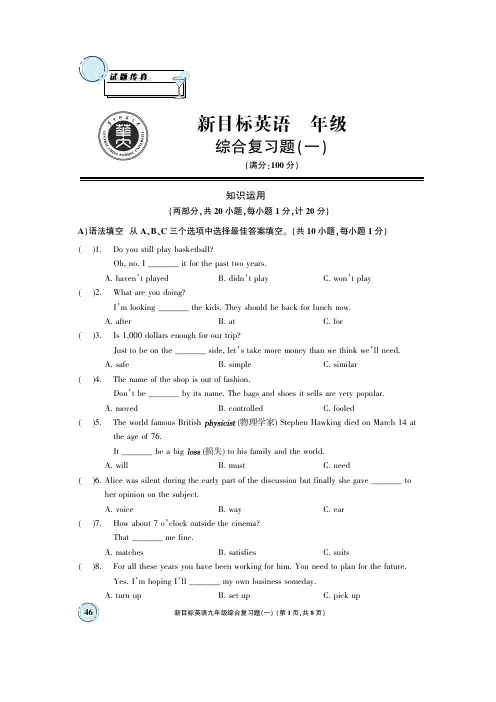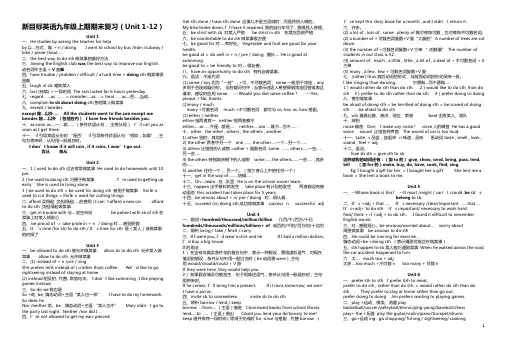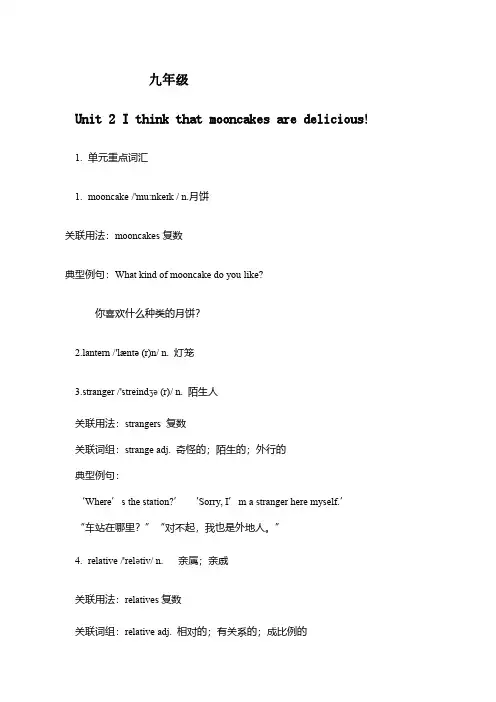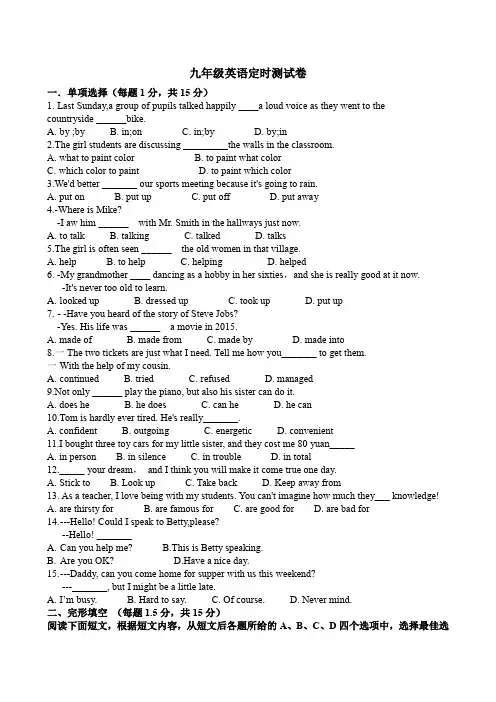新目标九年级英语总复习
新目标英语九年级综合复习题(一)

综合复习题(一)(满分:100分)新目标英语九年级新目标英语九年级综合复习题(一)(第1页,共8页)知识运用(两部分,共20小题,每小题1分,计20分)A )语法填空从A 、B 、C 三个选项中选择最佳答案填空。
(共10小题,每小题1分)()1.—Do you still play basketball?—Oh,no.I _______it for the past two years.A.haven ’t playedB.didn ’t playC.won ’t play ()2.—What are you doing?—I ’m looking _______the kids.They should be back for lunch now.A.afterB.atC.for ()3.—Is 1,000dollars enough for our trip?—Just to be on the _______side,let ’s take more money than we think we ’ll need.A.safeB.simpleC.similar ()4.—The name of the shop is out of fashion.—Don ’t be _______by its name.The bags and shoes it sells are very popular.A.movedB.controlledC.fooled ()5.—The world famous British(物理学家)Stephen Hawking died on March 14at the age of 76.—It _______be a big (损失)to his family and the world.A.willB.mustC.need ()6.Alice was silent during the early part of the discussion but finally she gave _______to her opinion on the subject.A.voice B.way C.ear ()7.—How about 7o ’clock outside the cinema?—That _______me fine.A.matchesB.satisfiesC.suits ()8.—For all these years you have been working for him.You need to plan for the future.—Yes.I ’m hoping I ’ll _______my own business someday.A.turn upB.set upC.pick up 46新目标英语九年级综合复习题(一)(第2页,共8页)()9.—Have you found a job yet?—No.I ’ve got two job offers,but I feel I would accept _______.A.eitherB.noneC.neither ()10.—Oh,my dear.Your shoes and clothes are wet through.—You can ’t imagine _______on such a windy and rainy night.A.what have I doneB.why did I go outsideC.where I have beenB )完形填空阅读短文,掌握其大意,从每题所给的A 、B 、C 三个选项中选择最佳答案填空。
新目标英语九年级上期期末复习

新目标英语九年级上期期末复习(Unit 1-12)Unit 1一、He studies by asking the teacher for helpby以…方式,靠+ n / doing I went to school by bus /train /subway / bike / plane /boat….二、the best way to do sth做某事的最好方法三、Joining the English club was the best way to improve our English.动名词作主语+V三单四、have trouble / problem / difficult / a hard time +doing sth做某事很困难五、laugh at sb.嘲笑某人六、last (持续) +一段时间The rain lasted for 6 hours yesterday.七、regard …..as ……= consider….as…..= treat …as….把…..当成…八、complain to sb about doing sth抱怨某人做某事九、except / besidesexcept除…以外….All the students went to the zoo except mebesides除….以外(包括在内)I have few friends besides you.十、as soon as….一….就……(条件状语从句,主将从现)I’ll call you as soon as I get there.十一、if引导宾语从句时“是否”if引导条件状语从句“假如,如果”,主句为将来时,从句用一般现在时。
I don’t know if it will rain,if it rains, I won’t go out.宾从条从Unit 2一、1)used to do sth过去常常做某事He used to do homework until 10 pm. 2)be used to doing sth习惯于做某事I’m used to getting up early.She is used to living alone.3)be used to do sth = be used for doing sth被用于做某事Knife is used to cut things = Knife is used for cutting things.二、afford买得起,负担得起(…的费用)I can’t afford a new car.afford to do sth负担得起做某事三、get in trouble with与….发生纠纷be patient with sb of sth在某事上对某人很耐心四、be proud of= take pride in + n/ doing对…..感到骄傲五、It ‘s time (for sb) to do sth / It’s time for sth是(某人)该做某事的时候了Unit 3一、be allowed to do sth被允许做某事allow sb to do sth允许某人做某事allow to do sth允许做某事二、(1) instead of + n /pre / vingShe prefers milk instead of (=rather than) coffee.We’d like to go sightseeing instead of staying at home.(2) instead相反的、代替。
人教版新目标初中英语九年级全一册 知识点总结2单元

九年级Unit2I think that mooncakes are delicious!1.单元重点词汇1.mooncake/'mu:nkeɪk/n.月饼关联用法:mooncakes复数典型例句:What kind of mooncake do you like?你喜欢什么种类的月饼?ntern/'læntə(r)n/n.灯笼3.stranger/'streindʒə(r)/n.陌生人关联用法:strangers复数关联词组:strange adj.奇怪的;陌生的;外行的典型例句:‘Where’s the station?’‘Sorry,I’m a stranger here myself.’“车站在哪里?”“对不起,我也是外地人。
”4.relative/'relətiv/n.亲属;亲戚关联用法:relatives复数关联词组:relative adj.相对的;有关系的;成比例的5.put on增加(体重);发胖关联用法:put on:穿上;上演;增加;假装;使…上场关联词组:put away储存(钱);储存…备用;储蓄put back拨回;向后移put down写下;记下;镇压put forward提出(意见、建议)put in打断;插嘴put off延期;推迟典型例句:She put on her coat and went out.她穿上外套,出去了。
Inactive people often put on weight later in life.不好动的人常常会在今后的生活中发胖。
6.pound/paund/n.磅(重量单位);英镑7.folk/fəul k/adj.民间的;民俗的8.goddess/'gɔdes/n.女神9.whoever/huːˈevə/pron.无论谁;不管什么人关联用法:whoever可以写成no matter who典型例句:I’ll take whoever wants to go.谁想去我就带谁去。
新目标英语九年级全册综合复习测试卷(无答案)

九年级英语定时测试卷一.单项选择(每题1分,共15分)1. Last Sunday,a group of pupils talked happily ____a loud voice as they went to thecountryside ______bike.A.by ;byB. in;onC. in;byD. by;in2.The girl students are discussing _________the walls in the classroom.A. what to paint colorB. to paint what colorC. which color to paintD. to paint which color3.We'd better _______ our sports meeting because it's going to rain.A. put onB. put upC. put offD. put away4.-Where is Mike?-I aw him ______ with Mr. Smith in the hallways just now.A.to talkB. talkingC. talkedD. talks5.The girl is often seen ______ the old women in that village.A. helpB. to helpC. helpingD. helped6. -My grandmother ____ dancing as a hobby in her sixties,and she is really good at it now.-It's never too old to learn.A.looked upB. dressed upC. took upD. put up7.--Have you heard of the story of Steve Jobs?-Yes. His life was ______ a movie in 2015.A. made ofB. made fromC. made byD. made into8.一The two tickets are just what I need. Tell me how you_______ to get them.一With the help of my cousin.A.continuedB. triedC. refusedD. managed9.Not only ______ play the piano, but also his sister can do it.A. does heB. he doesC. can heD. he can10.Tom is hardly ever tired. He's really_______.A. confidentB. outgoingC. energeticD. convenient11.I bought three toy cars for my little sister, and they cost me 80 yuan_____A. in personB. in silenceC. in troubleD. in total12._____ your dream,and I think you will make it come true one day.A. Stick toB. Look upC. Take backD. Keep away from13. As a teacher, I love being with my students. You can't imagine how much they___ knowledge!A. are thirsty forB. are famous forC. are good forD. are bad for14.---Hello! Could I speak to Betty,please?--Hello! _______A.Can you help me?B.This is Betty speaking.B.Are you OK? D.Have a nice day.15.---Daddy, can you come home for supper with us this weekend?---_______, but I might be a little late.A.I’m busy.B. Hard to say.C. Of course.D. Never mind.二、完形填空(每题1.5分,共15分)阅读下面短文,根据短文内容,从短文后各题所给的A、B、C、D四个选项中,选择最佳选项。
人教版新目标英语九年级全册单元知识点及配套练习

人教版新目标英语九年级全册单元知识点及配套练习九年级英语单元知识Unit 12、动词现在分词和不定式可作主语,表单数3、介词后面的动词形式(~ing);4、What about+~ing;How about+~ing;5、too+形(副)+to(不定式);6、find+宾语+宾语补足语;7、not…at all一点也不;8、get+形容词;11、instead/instead of;12、listen to13、ask(sb.)for(sth.);14、for example;15、have fun(doing sth.)16、end up(with…)17、spoken English;English—speaking people(countries)18、make mistakes 19.talk to(with) sb.20、why don’t you(we,they )+动词原形?=why not+动词原形?21、laugh at22、first of all23、to begin with.24、later on25、be afraid of sth.(doing)be afraid to do sth.be afraid that从句26、in class/out of class /after class27、take notes30、have trouble doing sth.31、look up32、make up a conversation.33、around the world.34、deal with35、stay(keep)+形容词36、go by37、decide(not)to do sth.40、complain about sth.41、compare sth to sth.(把…比作…);compare sth with sth.(把…与…进行比较)42、43、break off45、study for a test50、find sb./sth.+宾语补足语;find it +宾语补足语+(for sb.)to do sth.51、try one's best (to do sth.)52、with the help of sb=with one's help53、much tootoo muchUnit 21、过去常做某事:主语used to(不定式)be used to(介词)be used to(不定式)be used for sth.(doing)2、not…any more→no more;not…any longer→no longer5、复合词:a fifteen-year-old boy6、对某人而言做某事是…的:It's(形容词)for sb. to do sth.7、be able to do sth.8、give up(+ ~ing)9、afford sth.(to do sth.)10、be interested in sth.(doing.sth.)11、in front of…in the front of…12、be terrified ofbe afraid of13、go to bed(sleep)14、on the soccer team15、worry about sb.(sth.)be worried about…worry that从句16、all the time17、take a bus to(某地) = go to(某地)by bus 20、spend+time(money) on sth/(in)doing sth.)It takes(took)sb.+时间+to do sth.物cost(某人)+钱人 pay 钱 for 物。
初中新目标英语中考总复习英语版动词+doing和+to do

初中新目标英语中考总复习英语版动词+to do 和动词+doing 句型总结一、带动词ing形式1.keep doing2.keep sb. Doing3.practise doing sth.4.enjoy doing5.finish doing6.be afraid of doing7.be busy doing8.look forward to doing9.how about doing、./what about doing10.spend some time (in)doing11.spend some money (in) buying12.feel like doing13.stop/keep/prevent … from doing14.thank sb for doing15.thanks for doing16.dosomecooking/cleaning/reading/shopping/washing 17.goswimming/fishing/shopping/skating/boating18.mind doing19.can’t help doing20.consider doing21.have fun doing sthhave difficulty doing sthhave trouble doing sthhave problem doing sth22.waste time/money doing23.instead of doing 24.miss doing25.hold on to doing26.pay attention to doing27.suggest doing28.It’s time for doing29.There is sb doing sth30.be used to doing sth31.be used for doing sth32. have a lot of experience33. sb allow doing sth34. put off doing sth35. succeed in doing sth36. end up doing37. give up doing38.二.含有不带to的动词不定式句型:1.had better (not) do sth.2.would you please (not) do sth3.why not do sth.4.why don’t you do sth.5.Shall we do sth.?6.let sb do sth.7.make sb. do sth. have sb do sth8.feel sb do sth三、含有带to的动词不定式句型:1.It’s time to do sth.2.It takes sb. some time to do sth3.tell/ ask/ want/encourage/invite/ sb. todo sth.4.Would you like to do sth.?5.It’s good/bad to do sth6.It’s good/bad for sb.to do sth.7.be +adj.+ enough to do sth.8.sb. is ready to do sth.9.It’s + adj.+ for sb. to do sth.10.It’s + adj.+ of sb. to do sth11.would like/love /decide/want/wish/to dosth.12.would like/love sb. to do sth.13.Prefer to do sth. rather than do sth.14.how/ when/where/whether to do sth15.can’t wait to do16.too … to do …17.be afraid /ready/able/sure to do18.It’s time to do sth19.My job is to do sth20.My dream is to do sth21.My hobby is to do sth22.refuse to do sth23.warn sb to do sth24.pretend to do sth25..teach/learn to do sth26.need to do sth27.be willing to do sth28..try to do sth29.try one’s best to do sth30.agree to do sth31.seem to do sth32.plan to do sth /make a plan to do sth33.in order to do sth34.have a chance to do sth35.find it +adj + for sb to do sth36.have sth to do37.There is sth for sb to do38.be anxious to do39.afford to do sth40.两个动作连用,表目的ed to do sth42.be used to do sth43.be supposed to do sth44.allow sb to do sth45.sb be allowed to do sth46.the best way is to do sth47.the next step is to do sth48.have nothing to do with49.the first thing is to do sth50.it’s best to do sth51.it’s a good time to do sth52.it is a good way to do sth53.add to do54.urge sb to docate sb to do56.wait for sb to do57.order sb to do58.happen to do sth59.lead sb to do sth60.it’ a good place to do sth61.invite sb to do62.get to do sth63.expect to do64.volunteer to do sth 65.offer to do sth66.have an opportunity to do67.get sb to do sth68.it’s one’s duty to do sthe sth to do sth70.be sure to do sth71.have to do sth72.be able/unable to do sth四、既用带to的动词不定式又用ing形式的句型:1.stop to do/ doing2.forget to do/ doing3.remember to do/doing4.go on to do/doing5.like to do/doing6.love to do/doing7.prefer to do/doing8.hate to do/doing五、下列结构用带to的动词不定式和ing形式含义相同:、1..begin to do/doing2.start to do/doing3.continue to do/doing4.take turns to do/doing六、既用不带to的动词不定式又用现在分词的句型:用不带to的动词不定式强调动作的完成过程;用现在分词强调动作的进行状态。
人教版新目标 九年级英语全册重点短语和句型总结
九年级重点短语和句型Unit1 How can we become good learners?重点短语1. ask the teacher for help 向老师求助2. work with friends 和朋友一起学习3. study for a test 备考4.have conversations with sb,与……交谈5.read aloud 朗读speak loudly 大声说话6.speaking skills 口语技巧spoken English英语口语7.too…to… 太……而不能8.look up the words in a dictionary 查阅;look up抬头看9.It takes time 慢慢来,不着急10.the 比较级…the 比较级…,越…越…The more you read ,the faster you will be.11.it is adj for sb to do sth.find/think/make it adj (for sb) to do sth发现某人做某事I find it important (for us) to learn English.12.so that 以便,为了13. be afraid of doing sth. / be afraid to do sth. 害怕做某事……14.fall in love with 爱上15.something interesting 有趣的事情16.body language 肢体语言17.expressions on their faces 面部表情18.the secret to ( doing) sth .......的秘诀19.as well 也20.It’s a piece of cake.小菜一碟21.have a better understanding of 对...有更好的理解22.take notes 记笔记23.do sth by doing sth 通过某种方式做某事24.do grammar exercises 做语法习题25.memorize sentence patterns 记句型26.keep a diary 写日记27.make mistakes( in …)在……方面犯错误mistake A for B 错把……当成……28.increase to增加到…/ increase by增加了…29.at a /the speed of 以…的速度30.talk to sb.和某人交谈31,be born with 天生具有32.Whether or not…是否;Whether… or…无论是…还是…33.depend on 依靠依赖34.have something in common 有一些共同之处35.pay attention to (doing) sth 注意关注(做)某事36. connect …with …/ connect …to …把…和…联系37.think about 考虑38.even if 即使尽管纵容39.look for 寻找40.worry about 担心担忧41.word by word 一字一字地42so……that 如此……以至于43.the ability to do sth. 做某事的能力44. practice makes perfect.熟能生巧45 learn from….从/向….学习46.learning habits 学习习惯47.get bored 感到无聊48. be stressed out 焦虑不安的49. instead of 代替…50.over and over again 反反复复地51. from time to time. 有时52. on one’s own 独自一人,依靠自己53. develop one’s study skills.培养某人的学习技巧。
新目标人教版九年级英语(10—14单元)知识点总结
新目标人教版九年级英语(10—14单元)知识点总结(Unit 10- Unit 14)汇总Unit 10 XXX.一.重点词组1. be XXX被期望/要求做某事;应该2. XXX握手3. drop by顺便拜访4. after all毕竟;终归5. pick up拾起;捡起接某人6. make a noise发出噪音7. table manners餐桌礼仪8. get used to惯于9. XXX对…随意/放松10. get mad大动肝火;气愤11.clean…off把…擦掉12.take off脱下(衣服);(飞机等)起飞13.make an effort作出努力14.make sb XXX使某人感到宾至如归15.cut up切开;切碎16.be expected to do被期待做…17.make friends with与…交朋友18.XXX…就…19.to one’s surprise令某人吃惊的是20. be different from与…不同21.on time按时in time及时二.重点语法1.(1)suppose:猜测;假定XXX透露施展阐发“推测;假定”,that可省例:XXX.(2)be XXX被期望做某事,应该做某事。
相当于should 和ought to例:XXX.XXX to say hello to the foreigners.【练】You are supposed _____ hands when you meet for the first time.A. to shakeB. shakeC. shakingD. shook2. make plans to do == plan to do.打算做某事例She has made plans to go to Beijing.=She has planed to go to Beijing.go out of one’s way to do特意,专门做某事例:He went out of his way to make me happy.3. In Switzerland,it’XXX.阐发:it是方式主语,不定式是真正的主语。
最新人教新目标中考英语分册复习:九年级全一册Units3-4 精品课件
(2)direct的派生词: directly adv. 直接地;径直地 director n. 经理;导演 direction n. 指示;指导(不可数)
用法说明;操作指南(可数) 方向;方位(可数) 用direct的适当形式填空。
(1)He answered me very _d_i_r_e_ct_l_y_. (2)I gave him full _d_i_re_c_t_io__n_s_ to help him
人教新目标九年级全一册Units 3-4 总复习课件
1.知识清单 2.核心要点 3.语法 4.交际用语
(一)单词 1. _b_e_si_d_e____ prep. 在……旁边 2. _p_a_r_d_o_n_ v. 原谅 3. _r_u_sh______ v. & n. 仓促;急促 4. suggest→(名词)_s_u_g_ge_s_t_io_n_ 5. centre→(形容词)__c_e_n_t_r_al__
6. _fa_s_c_i_n_a_ti_n_g_ adj. 迷人的;机具吸引力的 7. crowded → (反义词) _u_n_c_r_o_w_d_e_d__ 8. _c_o_n_v_e_n_i_e_n_t_ adj. 方便的;便利的 9. polite→ (副词) p__o_li_te_l_y__→ (反义词)
8. silent adj. 不说话的;沉默的 [拓展] silently adv. 沉默地 silence n. 沉默 in silence 沉默地 根据句意及汉语提示完成句子。
(1) The teacher seemed angry. He wanted us to keep _s_il_e_n_t__ (沉默的), but we didn’t stop talking.
人教版新目标英语九年级上册期末语法专项复习试题及答案
人教版新目标英语九年级上册期末语法专项复习试题及答案1.XXX exercise.2.I tried to make the baby。
XXX last.3.How do you learn English so well。
By working hard and asking the teachers for help.4.How do you learn English words。
By making word cards.5.The old man makes a living by XXX.6.Hey。
Lily。
Come and sit by me.7.By last Sunday。
I had finished reading the book.8.By the way。
how do you usually come to school。
I usually come to school by taking the subway.9.He is a clever boy。
He made the model plane by himself.10.XXX XXX.宾语从句1.She asked me if I had finished the report.2.He didn't know what time the meeting started.3.I wonder if they will come to the party.4.Do you think that she will pass the exam?5.He asked if I could lend him some money.1."Mom。
XXX。
I don't know where I left it."2."Could you tell me what we can do by WeChat?"3."Could you please tell me when he will come back?"4."Mr。
- 1、下载文档前请自行甄别文档内容的完整性,平台不提供额外的编辑、内容补充、找答案等附加服务。
- 2、"仅部分预览"的文档,不可在线预览部分如存在完整性等问题,可反馈申请退款(可完整预览的文档不适用该条件!)。
- 3、如文档侵犯您的权益,请联系客服反馈,我们会尽快为您处理(人工客服工作时间:9:00-18:30)。
新目标九年级英语总复习Period Eight (八年级下Units 9—10)一、大纲要求词汇单词boaally, travel, discover, wonderful, population, dumpling, bravg, whenever, awake, umbrellagoodbye, cowbaby, holiday重点句型Have you ever been to an amuark?This means that you can find Daracters all ovller coaster.Tell me about yourself.So do I.二、重点解析单词</o:ulation(1) population 是集体名词,它作主语时,若指一个地区或国家的整体人口时谓语动词通常用单数;若强调整体人口中的成员时,谓语动词通常用复数。
eg:The popula. 南京的人口比上海少。
About twulaare farmers. 这儿大约2/5的人口是农民。
(2) 在询问人口时,注意population和people的区别,前者用what来提问,后者用how many 来提问。
eg: What’ula? 河北省的人口是多少?How many people a? 河北省有多少人?(3) 表达人口多少时要用large和small来修饰,不能用ma和few修饰。
eg:. 中国的人口比日本多。
2(1)常用作代词,意为“两者都不”。
eg:Nus can understand. 我们俩谁也不能理解。
Neither was vg. 两者都没有多大意思。
(2) 它还可用作形容词,意为“(两者)都不”,常在句中作定语。
eg:Neither answ两个答案都不对。
[注]neither作主语时,应看作是单数形式;neither所修饰的名词也应用单数形式。
(3)用在倒装句中表示“前者所说的内容也适合于后者”,意为“也不”。
eg:He doesn’t like Beethoven anddo I. 他不喜欢贝多芬的作品,我也不喜欢。
词语辨析</o:both all表示肯定意义表示否定意义表示两个人或事物b表示三个或三个以上的人或事物allnoneboth意为“两者都”;either意为“两者中的任何一个”;neither表示“两者中任何一个也不”。
none意为“三个或三个以上一个也不”,all指“三个或三个以上都……”。
(1) 用作形容词时,修饰单数名词,both修饰复数名词,all可以修饰复数名词,也可以指不可数名词。
eg: Nue. 两个故事都不真实。
You may taad. 你可以走两条路中的任何一条。
Bare red. 两支钢笔都是红色的。
All the water was poured. 所有的水都泼出去了。
(2) 用作代词时,neither/either常被看作单数,而both应看作是复数;all根据不同的情况可以看作是单数或复数。
eg:N两个都不是我的。
Both of us are teachers. 我们两个都是老师。
All of us a我们所有的人都在这儿。
(3)/none表示完全否定;而both/all和否定词not连用时,表示的是不完全否定意义。
eg: Nu is right. 你们两个都不对。
Bu aght. 你们两个并非都对。
重点句型1. Have you ever been to an amuark? 你曾经去过游乐园?have been to 意为“去过某地”。
have gone to 指“去了某地,但未回来”。
eg:as never been to . 她从来没去过北京。
—Wur deskmate? 你同桌去哪儿了?—He has gbookshop? 他去书店了。
2. This means that you can find Daracters all ovller coa这意味着在所有的过山车里你都能够看到迪斯尼人物。
mean是及物动词,意为“意思是……,意味着……”。
eg:What dword “argue” mean? “argue” 这个单词意思是什么?It means that he won’t come again. 这意味着他再也不会回来了。
[注]mean的名词形式为meaning. eg:What’aning of life? 生命的意义是什么?3. Tell me about yourself. 给我讲讲你的情况。
动词tell的用法:(1) tell sb. about sb. /sth. 意为“告诉某人有关某人/某事”。
eg:Could you tell me about your work? 你能告诉我你的工作情况吗?(2) 后接单宾语,意为“讲述、说、告诉”,该宾语通常是事物。
eg:like telling我妈妈喜欢讲笑话。
(3) 后接双宾语,即人和事物,表示“讲述、说、告诉”。
eg:She has toldg. 她已经告诉我这件事了。
(4) tell sb. (not) to do sth. 意为“吩咐/命令某人(不)做某事”。
eg:Tellwait. 叫他等一等。
(5) 它常与can, could, be able to 连用,意为“辨别,分辨”。
eg:I can’t tell Twin brother? 我不能分辨出汤姆和他的孪生兄弟。
4. So do 我也是。
“So+助动词/情态动词+主语”是倒装句结构,用于后一句陈述内容与前一句陈述内容相同,且前后的主语是不同的人,意为“某某也如此”。
若前后陈述的情况为否定式,用 Neither或Nor来替代So。
eg:—I am a teacher. 我是一名老师。
—他也是。
—She can’t dance. 她不会跳舞。
—Nor can I. 我也不会。
[注] 若前后两陈述句的主语一致,且陈述内容相同,则用So+主语+助动词/情态动词,意为“某某的确如此”。
eg:—He is very brave. 他很勇敢。
—的确如此。
5. I was having a hardding it until you came along. 我一直很难找到它,直到你走了过来。
have a good time doing sth. 意为“做某事很费劲”。
eg:The police had a hardding the lost child. 警察好不容易找到了这个走失的孩子。
6. I didn’t knowgirls, but they were all really friendl有些女孩子我不认识,但她们真的对我很友好。
be friendly to sb. 意为“对某人很友好”。
eg: My classmates adl我的同学对我很友好。
三、巩固练习1. The headmaster told us </st1:plaA. arrive B. arrivarrive D. arriving (2005. 北京)2. —Let’s go and play football, ?—That’s wonderful.A. will youB. do youC. won’t weD. shall we (2005. 江苏)3. —Ja ne, it’go school. Get up and have breakfast.—But I aling . I don’t fell like eating anything.A. badB. goodC. well (2005. 长沙)4. I told you notto be late agaI?A. doB. didC. don’tD. didn’t (2005. 河北)5. —listeningusic.—.A. So does HelenB. Also is HelenC. Helen likes alsoD. So Helen does (2005. 甘肃)6. —Do you mind if I?—.A. You are welcomeB. I’m afraidPlease don’t. It’s a non-smoking car (2005. 甘肃)7. Two foreigners agack and is PAB. aD(2005. 湖南)8. —You’ve llig—. I’ll go and tu A. So I have B. So do I C. Nor have I D. Neither I do (2005. 内蒙古)9. I bought two pabut </st1:AB(2005. 四川)10. —Tom, can you tell me where Jack is?—He A </Ulibrary.A. has goneB. had gas been (2005. 武汉)11. —Would yougo to Hainaummer?—If I don’t g o, .Awill she Bdwill she D. so d(2005. 辽宁)12. I had to buy these books because I didn’t know wwas the best.A. both BD. all (2005. 南京)13. —I like apples.—.AB. My bDon’t do that (2005. 重庆)14. It was a long journey, but C </Uur felt boring. AB. bD. all (2005. 黑龙江)15. —Have you ever us to your house on Saturday.A. invitingB. invitedC. inviteD. to invHurry up. Your parents ?A. does heB. don’t ID. isn’t he。
